Text
Tips To Boost Your Heart Health
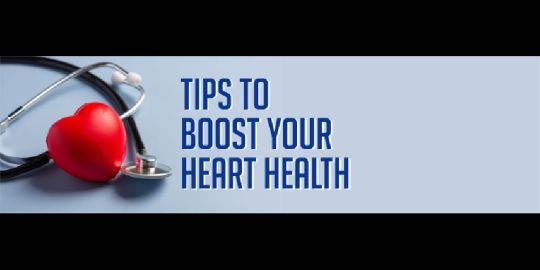
Cardiovascular disease is still one of the leading causes of death, but according to several research, making a few simple changes to your daily routine can make a significant difference. Here are a few tips you must start following for a healthy heart.
Perform aerobic exercises.
Regular exercise will help you reduce stress, sleep better, lose weight, and improve muscle tone and strength. Overall, exercise reduces the risk of developing other diseases such as high blood pressure and diabetes, both of which increase the risk of stroke and heart attack. Aerobic exercises such as jogging, running, fast walking, swimming, or biking should be done at least 30 minutes per day.
Lose Bodyweight.
There is scientific evidence that if you are overweight or obese, losing just 5-10% of your body weight improves your metabolic profile. This means that if you have high blood pressure and/or high cholesterol, these levels will decrease. The only way to successfully lose weight is to eat fewer calories, which should be supplemented with regular exercise. According to experts, one of the healthiest diets is one that is high in fruits, vegetables, and pulses, as well as some nuts, and seeds and a little olive oil.
Avoid trans fats.
We require fats in our diet, both saturated and unsaturated. One type of fat we don't need is trans-fat, which has been linked to an increased risk of developing heart disease or having a stroke over time. This is due to the fact that trans-fat clogs your arteries by increasing your bad cholesterol levels (LDL) while decreasing your good cholesterol levels (HDL). By eliminating them from your diet, you improve blood circulation throughout your body. So, what exactly are trans fats? They are industrial fats that are commonly used to add flavour and texture to packaged baked goods, snack foods, margarine, and fried fast foods. One must avoid them.
Practice good oral care.
Maintain good dental hygiene by brushing and flossing your teeth on a daily basis. Because dental health is a good indicator of overall health, including your heart. Many studies have shown that bacteria in the mouth that contribute to the development of gum disease can enter the bloodstream and cause an increase in C-reactive protein, a marker for inflammation in the blood vessels. It may increase your risk of heart disease and stroke. Brush your teeth at least once a day to prevent gum disease.
Keep your cholesterol down.
As we get older, our bodies produce more cholesterol, which can build up in our arteries and increase our risk of heart disease and stroke. Experts recommend getting your cholesterol checked regularly, but older people may need it more frequently. Your total cholesterol level should be less than 200 mg/dL, with an LDL level of less than 100 mg/dL and an HDL level of 60 mg/dL or higher.
Regular health checkups
Regular check-ups help in keeping track of your heart's performance and allows you to fine-tune your daily habits by ignoring the bad ones and instilling the good ones. In general, men over the age of 50 and women over the age of 55 are at a higher risk of developing heart disease. Keep it simple by getting regular checkups rather than repenting later when complications arise.
Follow the simple tips above to fortify your heart, because you never know what will happen. Begin making changes to your daily routine to strengthen your heart and live a long and happy life.
0 notes
Text
Understand Calories And Your Daily Requirement
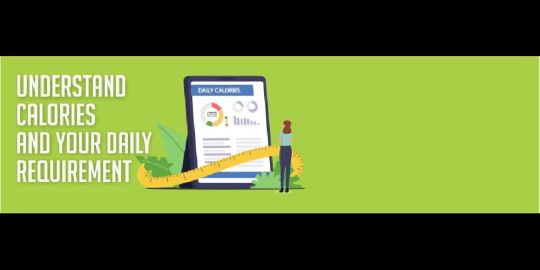
Calories in food provide energy in the form of heat for our bodies, allowing them to function. This means that we must consume a certain number of calories just to live.
The calories we consume provide our bodies with the energy they require to live and stay healthy. Everything we do, whether it's sitting on the couch or running a marathon, requires energy in the form of calories.
We will gain weight if we consistently consume more energy than we need. We will lose weight, fat, and muscle mass if we consume insufficient energy. Hence, intake must be as per our body's requirements.
Fast facts about calories consumption
Age, size, height, gender, lifestyle, and overall general health are all factors that influence calorie intake recommendations.
Ideally, adult females should consume 1,600 to 2,400 calories per day on average. It's 2,200 to 3,200 calories per day for adult men.
The brain consumes approximately 20% of the energy consumed by the human body.
Age, bone density, and muscle-fat ratio are all factors that influence ideal calorific intake.
Calories by food group:
The fact that calorie count alone does not determine whether a food is nutritious contributes to some of the confusion about calories. If a food contains vitamins, minerals, fibre or protein, its calories have more nutritional value for your body; these foods are sometimes referred to as "nutrient-dense". If a food lacks nutrition, it is referred to as an "empty calorie" or "energy-dense" food; it contains calories (or energy) but few nutrients.
The three macronutrients do not provide the same number of calories. Carbohydrates, protein and fat contain 4, 4 and 9 calories per gram respectively.
The Dietary Guidelines for Americans 2020–2025 recommend that your diet should be divided into the following percentages:
Protein content ranges from 10% to 35%.
Carbohydrate content ranges from 45 to 65%.
Fat content ranges from 20% to 35%.
Daily needs calculation
To calculate how many calories, you require, you must first determine your basal metabolic rate and an activity factor.
Basal metabolic rate
The Mifflin-St. Jeor equation is a useful tool for calculating BMR:
Men: 10 x weight (kg) + 6.25 x height (cm) – 5 x age (y) + 5
Women: 10 x weight (kg) + 6.25 x height (cm) – 5 x age (y) – 161
Multiply daily activities
Multiply the above BMR result by the following daily activity factor:
Sedentary lifestyle: Your daily calorie requirement is BMR x 1.2 if you do very little or no exercise.
Slightly active lifestyle: If you do light exercise one to three times per week, multiply BMR by 1.375.
Moderately active lifestyle: If you exercise three to five times per week, multiply your BMR by 1.55.
Active lifestyle: If you exercise intensely six to seven times per week, your daily calorie requirement is BMR x 1.725.
Extremely active lifestyle: If you exercise twice a day, your daily calorie requirement will be increased.
Keep track of your calorie intake.
Keeping track of your calorie intake to better understand how many calories your body requires. Whatever your goal, knowing how many calories you consume is critical to achieving it.
One method for counting calories is to keep a food diary and write down everything you eat, then look up the calorie count for each item.
0 notes
Text
Managing Diabetes During The Festive Season
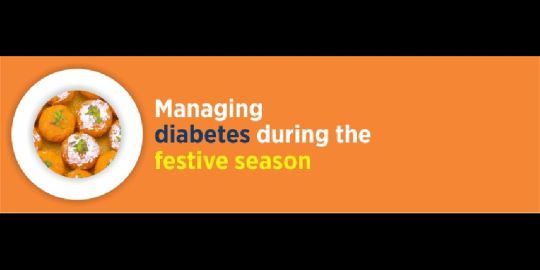
We Indians adore celebrations. There are numerous festivals available for this purpose. We have festivals celebrating the triumph of good over evil, festivals of lights and colours, and much more! And, of course, all of these festivals include plenty of fasting and feasting, which can make it difficult for a diabetic to keep diabetes under control.
Many festivals are lined up, beginning with Navaratri, Dussehra, Diwali, Chhath Puja, ending with Christmas. So, for diabetics, this is undoubtedly a trying time.
Pre-festive doctor consultation
People with diabetes have a tendency to throw caution to the wind and enjoy the festivities, only to discover that their blood sugar levels have skyrocketed. Diabetic patients should consult with their doctors prior to the festival, adhere to dietary restraint, and continue with their exercise schedule. People with diabetes should exercise caution when it comes to controlling their blood glucose levels.
Healthy alternatives during the festival
Traditional sweets could be replaced with the following healthy alternatives to ensure that health is not jeopardized during celebrations:
Choose healthy snacks such as nuts, olives, or a piece of fruit.
Consider eating good-quality dark chocolate instead of milk chocolate because it contains less sugar.
Avoid sugary drinks and replace them with sugar-free fresh fruit juices.
Important tips to follow
Keep track of your blood glucose levels on a regular basis.
Use skimmed milk instead of full-fat milk when making sweets at home.
Instead of sugar, use jaggery, dates or stevia as sweetener.
Stay away from high-calorie snacks like samosas and papads. Choose roasted almonds, walnuts, or hazelnuts instead.
Adjust your insulin dosage based on your carbohydrate intake.
Limit your consumption of caffeine-containing products.
Try eating on a smaller plate. When you look at the plate, you get a sense of fullness.
Fasting Tips for People with Diabetes during Navratri
Fasting is an integral part of festival celebrations in India. It is advised that you check your blood sugar levels several times throughout the day. Also, it is highly recommended that one must break fasting if blood sugar levels are less than 70 mg/dL within the first few hours of fasting.
1. Consume slow-absorbing foods with a low glycemic index before beginning the fast. Potatoes should be avoided.
2. One can eat roasted peanuts, paneer, water chestnuts (singhara), and pumpkin raita. Chapati can be made with amaranth flour.
3. If you take insulin, you may need to adjust your insulin dose because your insulin requirement may decrease by up to 40%.
4. Don't go more than 2 hours without eating anything. Consume something light, such as fruit.
5. Drink a glass of lukewarm lemon water without sugar twice a day.
Indian festivals are occasions marked by the serving of sweets and other mouthwatering dishes. Diabetes patients can still enjoy these festivals as long as they take a few simple precautions to keep their blood sugar levels under control.
0 notes
Text
National Nutrition Week 2021
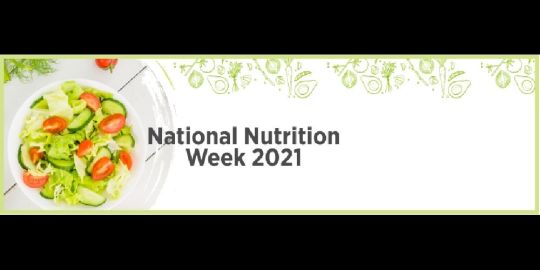
National Nutrition Week (NNW) is an annual nutrition event organized by the Food and Nutrition Board within the Ministry of Women and Child Development, Government of India. It is held from September 1st to September 7th every year, to raise awareness about nutrition and to emphasize its importance. As we near the end of National Nutrition Week, continue reading to find out what it's all about!
Theme for year 2021
Nutrition is the process of supplying the necessary food for optimal health and growth. It is a scientific field that deals with nutrients. Nutrients are essential for survival, growth, health, reproduction, and disease prevention. A healthy and balanced diet contains all of the nutrients that the body requires, such as vitamins, essential fats, minerals, carbohydrates, proteins, and so on. The human body requires seven major types of nutrients to maintain a healthy lifestyle. Carbohydrates, fats, dietary fibre, minerals, proteins, vitamins, and water are the seven nutrients that can be classified as macronutrients or micronutrients.
The theme of this year's National Nutrition Week is "Feeding Smart Right from the Start." The government has launched a programme to disseminate accurate information and raise public awareness through seminars and workshops. It focuses on informing people about the benefits of a nutritious diet from the time they are born, through a variety of initiatives.
Here is a list of different diets and how they can help you get enough nutrients.
Atkins Diet:
When large amounts of refined carbohydrates are consumed, insulin levels in the body rapidly rise and fall, causing the body to store energy from the consumed food as fat, making it less likely to be used as a source of energy later. The nutritional emphasis of the Atkins diet ensures that your body becomes accustomed to eating more vegetables rather than high-carbohydrate junk foods.
Zone Diet
The Zone diet meets the requirements for a more balanced diet, which includes 40 percent carbohydrates, 30 percent fats, and 30 percent protein in each meal. The goal here, too, is to regulate insulin levels in the body, which leads to better weight loss and body weight control. Carbohydrates consumed during this diet should have a low glycemic index, which ensures a slow release of sugar in the body and, as a result, keeps you feeling full for longer periods of time.
Vegan Diet:
Veganism has evolved into a lifestyle choice and philosophy rather than just a diet. It forbids the consumption of anything derived from animals, including dairy, honey, milk, and eggs. Veganism emphasizes the environmental and ethical and compassionate benefits of this practice. Even on a vegan diet, you can get the majority of the nutrients your body needs from various plants and fruits. Carbohydrate-rich foods can be a great way to supplement a vegan diet.
Raw Food Diet:
A raw food diet, as the name implies, consists of consuming only unprocessed foods and beverages that are entirely plant-based and, ideally, organic. This diet also adheres to the rule that three-quarters of a person's daily food intake should consist of uncooked foods. This diet provides the body with more nutrition because cooking or heating the food destroys the nutrients and natural enzymes found in it.
0 notes
Text
Metabolism. And How Can We Boost It?
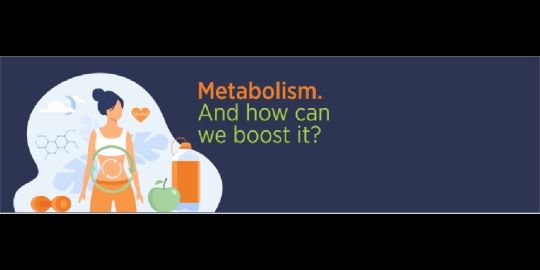
Metabolism. It is the collection of chemical transformations that sustain life within the cells of living organisms. It refers to all of the chemical reactions that occur in your body. These chemical reactions are what keep your body alive and running. However, the terms metabolism and metabolic rate, or the number of calories burned, are frequently used interchangeably. A high level of metabolism will provide you with energy and make you feel better.
It's understandable to feel as if you don't have control over such a large concept. But that's not the case. Here are a few ways to boost your metabolism.
Eat at a regular interval
The body relies on consistency. Eating at regular intervals aids in maintaining the metabolic balance. Otherwise, if a person eats a lot and then there is a big gap between meals, the body may burn calories more slowly and store more fat cells. This imbalance can be controlled by eating at regular times. A person should ideally eat several small meals spaced about 3 or 4 hours apart.
Eating enough calories
Just eating won't help, but you must have the right amount of calorie intake too. Because eating too few calories can cause the body's metabolism to slow down to conserve energy. Adult women require between 1,600 and 2,400 calories per day, depending on their level of physical activity, while men require between 2,000 and 3,000.
Get enough B vitamins
B vitamins play an important role in metabolic rate. B1 (thiamine), B2 (riboflavin), and B6 are all important B vitamins. B vitamins can be found in a variety of foods, including bananas, eggs, baked potatoes, orange juice, peanut butter, and whole-grain foods, to name a few.
Resistance Training
Strength training, also known as resistance training, is a type of exercise that helps build muscles, which can boost metabolism. This means that more energy is needed to maintain muscle mass. Our bodies naturally lose muscle mass as we age, but regular resistance training can help prevent this. To build muscles, resistance training typically entails lifting weights and performing exercises that use resistance bands or body weight.
Keep stress away
Avoid stress and anxiety as much as possible. Deep breathing exercises or meditation may be beneficial. You can also resurrect a teen activity that encourages movement, such as gardening or photography.
Important day routine tips
To cleanse the body of toxins, start your day with lime juice and honey mixed in a glass of lukewarm water.
Breakfast should never be skipped. Having breakfast regularly helps to rev up your internal metabolic engines.
Snack on something nutritious. Avoid the calorie-laden pizzas, chips, and burgers. Your key to fitness is a handful of unsalted nuts or seasonal fruit.
Every day, drink at least 2 litres of water. Coffee and green tea should be consumed in moderation.
Try to go to bed at a consistent time and get at least 6-7 hours of sleep per day.
Remember that only by eating well, staying active, and adopting a healthy lifestyle can you see a visible improvement in your body. Keep moving, stay happy, and stay healthy!
0 notes
Text
Stress And The Immune System Are Interconnected
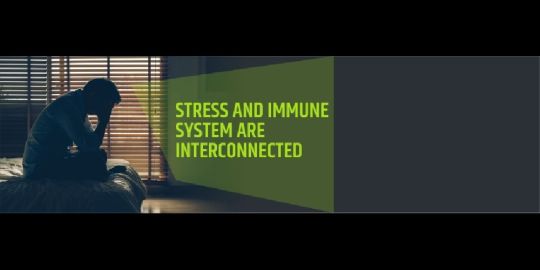
"Mind over matter" is more than just a phrase. There is a complicated relationship between stress and the immune system. When you are stressed about your work, family or finances, your immune system recognizes it. Because, the body's natural defender is sensitive to psychological stress, especially chronic stress.
What does the research say?
According to the American Psychological Association, stress can reduce the number of natural killer cells or lymphocytes in the body, which are needed to fight viruses.
When we are stressed, our brain sends defense signals to the endocrine system, then releases a slew of hormones that can severely depress our immunity. According to experts, stress is responsible for up to 90% of all diseases, including cancer and heart disease. Because, stress induces chemical reactions and floods the body with cortisol, which reduces inflammation, decreases white blood cells and NK cells (special cells that kill cancer), increases tumor development and growth, and increases the rate of infection and tissue damage.
Check it yourself
Ask yourself these questions and answer them honestly. If you answered yes to one or more of these questions, it could be a sign that your body is reacting to stress and you should immediately act.
Do you pick fights with your family, friends, or coworkers?
Do you have a constant state of agitation?
Is your stomach clenched?
Are your sleeping patterns disrupted, with you sleeping too much or too little?
Hence, it is crucial to be aware of the simple daily stress in our lives.
Preventive Tips for Reducing Stress:
1. Relaxation exercises
Specific relaxation exercises, such as meditation and yoga, can help to strengthen the connection between the mind and body. By incorporating them into our daily lives, they serve as a buffer against the breakdown of organ systems.
2. Positive thinking
Evidence suggests that people who believe they are doing better and have a positive attitude perform better than those who are less optimistic. Because, anxiety, hostility, and other negative emotions also have an impact on our immune system, according to various research.
3. Social support
Researchers discovered that people who have strong social support have better overall health and are more resistant to infection and disease. Changing our behavior can often break stress-inducing habits.
Wrap up
Stress has become an unavoidable part of everyday life. Though most people do not consider stress to be a serious issue, it has a wide-ranging impact on health. Acute stress weakens your immune system, opening the door to a variety of illnesses. However, the good news is that you can manage stress by using the methods listed above. Staying stress-free will automatically benefit your health.
0 notes
Text
World Mosquito Day

When Ronald Ross discovered in 1897 that mosquitos transmit malaria, he changed our understanding of the disease and raised awareness about malaria prevention. Since then, this day has been observed as World Mosquito Day, to increase public awareness of the disease. If we look at the WHO report on mosquito-borne deaths worldwide each year, we will see that it exceeds 500 million. It is one of the most dangerous vector diseases, killing one child every 30 seconds and 3000 children per day.
Let's talk about the most common diseases spread by mosquitos, how they're transmitted, and how you can protect yourself.
Malaria
Every year, over a million people, are killed by this heinous disease. Plasmodium, a protozoan carried by the female (Anopheles) mosquito, causes malaria. When a mosquito bites an infected person or animal, the organism matures in her gut and transmits the infection to another person. The protozoa infect red blood cells, causing them to burst open and unleash a torrent of illness that includes high fever, body aches, abdominal pain, vomiting, and diarrhoea. Antimalarial medications are effective, but always consult your doctor before taking them.
Zika
You've probably heard of the Zika virus in the last few years. The Zika virus is transmitted both by mosquitos and through sexual contact. The main concern with Zika is that it has a high potential for neurological damage in healthy victims, and it can be fatal in pregnant women. The virus causes severe brain/skull deformities in unborn children, a condition known as "microcephaly." If you are pregnant and planning a trip to a Zika-affected area, you should seek medical advice before going.
Chikungunya
Chikungunya virus is one of the milder mosquito-borne infections. The virus, which is spread by infected Aedes species mosquitos, causes symptoms in the majority of people. It causes mild flu-like symptoms, as well as persistent joint pain and swelling. If you've been infected once, you're usually immune to future infections. Chikungunya is found in parts of Africa, Asia, India, the Caribbean, and extensively throughout the Americas, including most US states.
Dengue
The mosquito vectors are the same Aedes species that cause Zika and Chikungunya. This virus is extremely harmful. The mildest form of this disease is colloquially known as "break-bone fever," which pretty much sums it up. A high fever, headache, and malaise are all symptoms of severe bone and joint pain. An advanced (but thankfully rare) stage of Dengue is classified as a hemorrhagic fever, characterised by bloody vomiting and diarrhoea, as well as possible organ damage and weeks or months of recovery.
Here are some precautions to take to avoid being exposed:
· Apply mosquito repellent to any exposed skin and clothing.
· Wear long sleeves and pants if you're going to be outside at dawn or dusk.
· Avoid rainwater collection barrels or swampy wetlands. This is mosquito "ground-zero".
· Make sure to check the travel advisories for the country you will be visiting.
· If you're going camping or sleeping outside, use mosquito nets and make sure your tent is well-sealed.
Also, keep in mind that, as frightening as these diseases may sound, they are relatively rare. Just take a few precautions and never let the fear of becoming ill dampen your plan. Stay alert, be healthy and safe. Also, keep in mind that, as frightening as these diseases may sound, they are relatively rare. Just take a few precautions and never let the fear of becoming ill dampen your plan. Stay alert, be healthy and safe.
0 notes
Text
Breastfeeding Awareness.
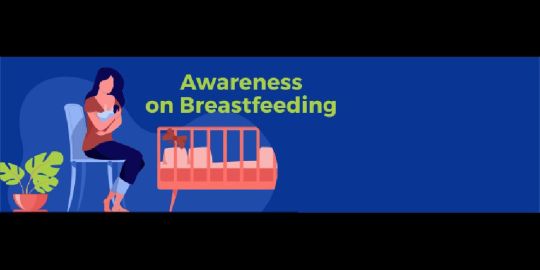
Breastfeeding Awareness programs are held in 1st week of August every year to encourage breast feeding by every woman for the wellbeing of child and the mother. And this year too, it will be held under the shadow of COVID-19. But breastfeeding mothers who are concerned about the pandemic will have little to worry about if proper precautions are taken. According to a study, published in The Lancet, even COVID-19-infected mothers are unlikely to pass the virus onto their children through breast milk.
During the nursing process, a mask should still be worn, and other precautions should be taken, such as sneezing or coughing into the elbow or making use of disposable tissues. Wash your hands after any type of exposure, and regularly disinfect and clean surfaces at home.
Let's look at some of the benefits.
Breast milk boosts the baby's immune system & protects against infection because it contains antibodies and immunoglobulins (glycoprotein molecules produced by plasma cells and white blood cells).
Breast milk keeps babies hydrated, especially if they are fed on demand. Because, (of its high water content) it suffices for the overall water requirement of the baby, especially if the child is exclusively breastfed.
Breastfeeding encourages healthy weight gain and aids in the prevention of childhood obesity.
According to the American Academy of Pediatrics, breastfeeding also plays a role in the prevention of SIDS (sudden infant death syndrome)
Mothers who breastfeed have a lower risk for post-partum depression
A few tips for new moms
Get enough rest.
If you don't get enough sleep, you'll naturally be more stressed, and the subsequent release of stress hormones will decrease the milk production. It is critical that you try to sleep when your baby sleeps or ask someone else to babysit while you get some much-needed nap.
What to eat?
Breastfeeding necessitates a substantial amount of fuel in order to produce high-quality milk. Include bone broth, coconut, lentils, oatmeal, chickpeas, and sweet potatoes in your daily diet as much as possible to produce great breast milk.
What to avoid?
Avoid alcohol because it can pass from the mother's milk to the child's body and cause permanent neurological damage. Tea and coffee should also be avoided because caffeine disrupts your baby's sleep. Also, avoid foods that cause gas, such as onions, garlic, and broccoli. Excess gas will upset the baby, and will also have an effect on milk production.
Breastfeeding benefits for mothers
Moms should also be aware that breastfeeding benefits more than just their babies.
Breastfeeding helps women lose weight naturally
It promotes womb involution, which causes it to return to its original size
It reduces post-partum bleeding, and women will have fewer urinary tract infections
It significantly lowers the risk of anemia.
According to UNICEF and WHO, "Breastfeeding is one of the most effective ways to save and improve the lives of children, yielding lifelong health benefits for infants and their mothers." Breastfeeding is still the most important form of protection we can offer a newborn.
0 notes
Text
Digital Detox - Time To Take A Break From Technology

Do you frequently find yourself glued to your smartphone screen, scrolling indefinitely? According to research, approximately 61% of people admit to being addicted to the internet and gadgets. Our digital habits have become so ingrained that we are in danger of losing the ability to concentrate. Another research also indicates that majority of us check our phones 150 times a day, imagine the impact on our productivity levels.
We are on the verge of digital burnout due to a greater reliance on technology to complete tasks. This is where a digital detox comes into play. It is a time when you intentionally limit your time spent online and even choose to unplug entirely. A digital detox is intended to alleviate the stress, overstimulation, and compulsive behaviors associated with technology use. Here are a few ways to do a digital detox:
Creating a list of all the activities
This is the first step in the right direction; not only will it help you limit your usage, but it will also make you proactive. Cutting back on the unnecessary time spent on mobile phones allows you to reclaim those hours and improves your focus. Making a list helps you to prioritize your time and effectively complete the tasks at hand.
Create no-phone zones:
Use technology breaks to remind yourself not to give into the temptation to pick up your phone. Putting your phone away also communicates to family and friends that you are focused on them and not the screen. To get more distance, you could switch to airplane mode. Set some ground rules before embarking on your technology break like maintaining a timer.
Delete time-stealing apps
You know how much time your unwanted apps are taking up, so you can either delete them temporarily or permanently. You will discover that you are more productive and can devote more time to the things that truly matter in your life, such as spending time with loved ones. You will also be able to clear your mind and reset as a result of doing so.
Set A Daily Screen Time
Set realistic goals for yourself to help you keep your habits in check. It is critical to ensure that you are not spending excessive amounts of time staring at a screen during the day, especially if your work is screen-based. Manage this, and you'll discover that it's something you can gradually reduce as you gain independence from your devices.
Stop using your phone before bed
Virtually every device we use has light-emitting diodes that give off blue wavelength light. It keeps us awake if we consume too much of it. Because it's that blue light that wreaks havoc on our body's melatonin production. It tricks the brain into thinking its daytime, making us feel more alert when we should be sleepy. This melatonin disruption can be devastating over time.
We need to do a digital detox if we are to take better care of our health. We hope the above mentioned tips are useful to you.
0 notes
Text
Common Communicable Diseases During Festive Times Ahead
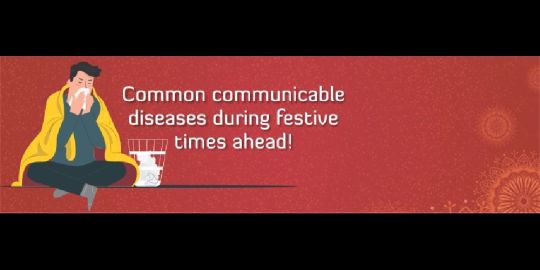
Indians are referred to as Utsav Priyah or festival lovers. The word Utsav (comes from the Sanskrit word Stavan) refers to an event or a series of events that is overflowing with joy. Festivals have always been laced with fanfare and extravaganza, with socializing being the hallmark of the celebration. To most Indians, this is what a truly festive season entails. However, the fear of COVID-19 has dampened the festive spirit since, the previous year. We must be extra cautious as we approach the festival season, which is also conducive to the spread of other communicable diseases.
Let's look at a few of the most common communicable diseases:
1. Malaria
Almost the entire Indian population is at risk of contracting malaria (almost 95 %). According to the World Health Organization (WHO), India accounts for 77 % of all malaria cases in Southeast Asia. Keeping mosquitoes at bay by wearing clothing that covers the entire body and using mosquito repellents may be the best way to combat the disease.
2. Typhoid
A water-borne monsoon disease is spread by contaminated water and unsanitary food preparation methods. Typhoid is caused by the Styptic bacteria, which thrives in unhygienic and dirty conditions. Typhoid is dangerous because it can often live in a person's gallbladder despite treatment. Fever, abdominal pain, and severe headaches are all symptoms of infection. It is recommended that proper hygiene and sanitation be maintained, as well as the use of clean water.
3. Hepatitis
The inflammation of the liver is referred to as hepatitis. It can be caused by viruses (five different viruses called A, B, C, D, and E cause viral Hepatitis), bacterial infections, or long-term exposure to alcohol, drugs, or toxic chemicals like those found in aerosol sprays and paint thinners. General weakness and fatigue, loss of appetite, nausea, fever, abdominal pain, and tenderness are some of the most common symptoms.
4. Tuberculosis
Tuberculosis, or TB, may sound like a disease of the past, but it is still a real threat today. Tuberculosis is India's most serious public health issue. It is estimated that 500,000 people die each year as a result of this disease, while a similar number of people are cured. Poor diet, overcrowding, and a lack of knowledge all increase the likelihood of developing the disease.
Apart from the above-mentioned diseases, jaundice, leptospirosis, amoebiasis, brucellosis, hookworm infection, influenza, filariasis, and tuberculosis are a few other common diseases.
Few tips to stay safe during festive times :
Follow all precautions - It goes without saying, but most people do not care much when it comes to taking preventative measures. Wearing a mask and regularly washing your hands are two basic precautions you should take to keep yourself and your loved ones safe.
Do not ignore any symptoms - Even the mildest symptoms should not be dismissed as "seasonal flu" or "common cold." This is not only because you may endanger others, but also because your body may be more vulnerable to COVID-19 if your immunity is weakened due to another infection.
Avoid assumptions - People have a common assumption that they will not become ill, and as a result, they are careless. Making assumptions about the disease or the virus's behavior can be extremely dangerous. Consult with a doctor and get the best advice possible.
Refrain from eating outside - It is recommended that you avoid eating outside during the festival, not only because of the risk of COVID-19 but also because such food can cause other stomach infections, affecting your immunity and overall health. Also, at a festival, there's nothing like a home-cooked, traditional meal, right?
Festivals, like most things in 2020, will look and feel nearly identical this year as well. However, with proper preparation and caution, you can still enjoy the festival with the same joy and fun.
0 notes
Text
Work-Life Balance During The Pandemic

The new normal, work-from-home culture, has introduced a completely new set of pressures on all of us. Everyone is trying to balance work deadlines, family, friends, and social media. The lines between work and life have never been more blurred. It's even more difficult to maintain social connections.
Work-life balance refers to how you prioritize time and effort between professional and personal responsibilities. A healthy work-life balance will give you enough time to focus on your personal life, such as spending good time with family, doing things you enjoy, and so on.
Let's look at how you can maintain a work-life balance while also reducing the strain on your already stressed-out minds.
Create a dedicated workspace.
You probably prefer to sit on your bed with a cup of coffee in your hand. In fact, working from your bed is not the best idea if you want to successfully balance work and life. It is advised to avoid working in a location that you strongly associate with relaxation. Even if you don't have a spare room, make sure you have a dedicated space or corner.
Prioritize your work.
You may have multiple tasks on your to-do list. Prioritize those tasks into three categories:
Urgent and important
Important but not urgent
Urgent but not important
You'll be able to set goals and plan your days once you know what you need to work on. But always set achievable goals in order to increase your chances of success.
Set boundaries with technology.
Unwind after work because you do not have that travel time from the office to home. Furthermore, don't be afraid to unplug for a few minutes to an hour in day. Put your phone away, disconnect from the internet and allow yourself to relax and decompress. Because your well-being is of the utmost importance. If you are healthy and happy, then only you can be a better employee, friend, partner, parent, and so on.
Stay active.
Being physically fit increases your tolerance to stress. Eat a well-balanced, healthy diet and get plenty of rest. Don't use any kind of substance abuse like alcohol, or cigarettes to deal with stress; they'll only make things worse. Exercise, yoga, and meditation on a regular basis help to reduce stress, depression, and anxiety. It will also strengthen your immune system and keep you away from the doctor's office.
Get help if you need it.
Lastly, don't let stress interfere with your health and happiness. If you find yourself feeling overstressed on a regular basis, seek the assistance of a health professional. Asking for help is not a sign of weakness; rather, it is a sign of strength to take care of yourself.
No doubt, things have changed dramatically in recent times, but you now have far more freedom to live 'balanced' lives. Just figure out better ways to complete tasks or discuss workload with your coworkers and boss. Remember, you are in the driver's seat and in complete control.
0 notes
Text
World Population Day 2021
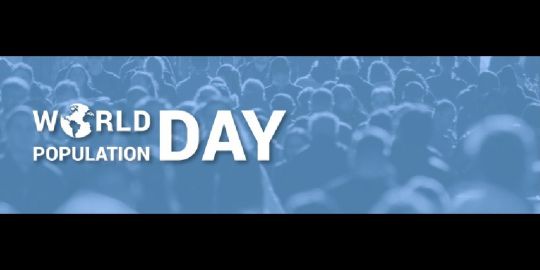
World Population Day 2021
Are you aware of how many people are there on the planet? It is more than seven billion. To be precise, the human population has grown approximately to 7.5 billion people in the 50,000 years since the beginning of human history. Five Billion Day was established in 1987 to commemorate the date when the world's population reached an estimated five billion people, which supposedly occurred on 11th July of that year. In 1989, the United Nations designated 11th July as World Population Day to spread awareness about population-related issues around the world. The day is especially significant for India, which has the world's second-largest population after China.
The global population reached 7 billion in 2011, and it now stands at around 7.7 billion. According to the UN, the population could reach 8.5 billion in 2030, 9.7 billion in 2050, and 10.9 billion in 2100.
World Population Day theme 2021
Every year, the day is observed with a particular theme to draw attention to various issues such as child marriage, gender equality, human rights, and many others. Since last year, the world has suffered as a result of COVID-19. The pandemic has had a particularly negative impact on the population. As a result, this year's theme is "Rights and Choices are the Answer: the solution to shifting fertility rates lies in prioritizing all people's reproductive health and rights." The deadly virus's impact on sexual and reproductive health was palpable. Millions of lives have been lost as a result of the pandemic, but there has also been an increase in domestic violence against women. As they were forced to live in isolation with their abusers; certain women delayed motherhood; and unintended pregnancies due to limited access to contraceptive services.
According to the UN, the pandemic will push 47 million women and girls into extreme poverty. Furthermore, many girls who are no longer in school may never return. There is an erosion of women's rights and choices. Due to the onset of the pandemic, resources for reproductive health services were diverted.
So, how do we solve these issues?
As individuals, and as a society, we can address the pressing issues related to overpopulation that affect all of us directly or indirectly.
Ensuring that all children receive at least primary education.
Create awareness about family planning and safe sex practices.
Ensuring a healthy diet for new mothers and children.
Improving hospital and maternity facilities.
0 notes
Text
An Inverse Relationship Between Smoking And Covid-19

An inverse relationship between smoking and COVID-19
A very common message that everyone has heard a million times before: "Quit Smoking." However, it is now being delivered with greater urgency during the current pandemic. Today, May 31st is No Tobacco Day, and it is the ideal time for smokers to kick the habit.
According to a World Health Organization review, smoking is linked to a higher risk of death in people who require hospital treatment for COVID-19. Also as per the UK study published in January 2021(1), smokers who contract coronavirus are more likely to visit the hospital than nonsmokers.
Important facts about smokers
According to a study, published in the journal Thorax(2),
· Smokers are more likely to get hospitalized
· 29% of individuals are more likely to report more than five symptoms of COVID-19.
· 50% are more likely to report more than ten COVID-19 symptoms, including loss of smell, skipping meals, or muscle pain.
How Does Smoking Increase Your Risk?
Intake of Tobacco puts smokers at risk for a variety of serious health problems, including cardiovascular and chronic lung diseases. People with these underlying health conditions have greater chances of being hospitalized or succumb to COVID-19. Smoking also affects the immune system, making smoker’s more susceptible to COVID-19. According to the World Health Organization, "smoking impairs lung function, making it more difficult for the body to fight off corona virus and other diseases."
Complications Of Smoking And COVID-19
Smoking increases the likelihood of developing blood clots. The novel coronavirus can cause even more harm to a smoker's body because it floods the body with inflammatory cells that thicken your blood. COVID-19 also targets angiotensin-converting enzyme 2 (ACE2), a protein found in the lining of the lungs that is more abundant in smokers.
The immediate benefits of quitting smoking
As per American Cancer Society(2), the following are the immediate benefits if you quit smoking today
· Elevated heart rate and blood pressure drop within 20 minutes of quitting.
· The carbon monoxide level in the bloodstream returns to normal after 12 hours.
· Circulation and lung function improve within 2 to 12 weeks.
· Coughing and shortness of breath subside after 1 to 12 months.
Studies have shown that your body begins to heal soon after you stop smoking. Within the first few weeks and months, your lungs begin to function better, and your risk of a heart attack decreases. Quitting smoking improves your health and can add years to your life.
There's never been a better time to kick the habit. Most people find quitting difficult, but it is a very small and important step you can take to protect yourself and your loved ones during the COVID-19 pandemic.
Research
(1) UK Research: https://thorax.bmj.com/content/early/2021/02/07/thoraxjnl-2020-216422
(2) American Cancer Society: https://www.cancer.org/healthy/stay-away-from-tobacco/benefits-of-quitting-smoking-over-time.html
0 notes
Text
Wellness Tips For A Healthy Holi

Wellness Tips for a Healthy Holi
The festival of colours is here. But as the cases of coronavirus are on the rise, it is advisable to enjoy the festival like a responsible citizen. Covid-19 has transformed the way we do everything, and what was once considered 'normal' now feels like an entirely different lifetime ago. Let’s enjoy the festival of colours with same fun but with little more caution and care.
Please strictly follow the safety measures:
Avoid crowd, create a social bubble and celebrate holi with your close friends and family.
Do not smear colours on your face or on the faces of others.
Don't touch your face with unwashed hands while playing Holi.
Avoid close contact with people.
Don't forget to wear the mask all the time. If possible, put on the face mask while playing Holi.
Keep a hand sanitizer handy. If you are wearing a mask/gloves, discard it properly after celebrations.
Hair Care
Before playing with colours, apply good amount of oil to your hair, so that the colour can slip away from your hair and never settle on the scalp. The best way is to tie your hair and cover it with a scarf or cap. After celebration, make sure to clean it while the hair is wet.
Skin Care
Sun protection is very helpful to protect the skin from the harmful chemicals that are used in Holi colours. The colours whether dry or wet make the skin prone to infections and allergies. A sunscreen, moisturizer, body lotion or oil prevents the colours from penetrating the skin pores as they create a sheath around your body. You can either apply almond/coconut oil right before stepping out on the day of Holi to ensure proper skin protection.
Eye Care
The colours available in the market contain toxic chemicals like lead oxide, copper sulfate, heavy metals, acids, alkalis, mica, asbestos, talc, silica, tc. If these colour comes in contact with the eye, it can cause eye irritation and even serious vision complications. Dab on some eye cream or vaseline gel to keep the area surrounding the eyes moisturized. In the case of colours splashed on your eyes, flush your eye with lots of clean water. Use clean, lukewarm tap water for at least 20 minutes. It is important to try and remove as much of the color from the eye as is possible, immediately.
It is advisable to avoid unnecessary trips to malls, markets or any public spaces which are crowded. It is also advisable to play Holi with family or small groups of people but no outsiders or mass gatherings. Children and senior citizens should refrain from exchanging gifts / shaking hands. Overall, do not panic, keep a safe distance from the people who display signs of cold, fever or flu like symptoms.
Check local authority advisory in your area and follow them. Greet people with an open heart, avoid shaking hands and hugging. Wear masks and follow Covid-19 guidelines.
0 notes
Text
Celebrating 'World Oral Health Day 2021'

Our mouth is a mirror to our body and reflects our well-being and level of wellness. Every day is an important day to take care of oral health. Yes, it's time to celebrate World Oral Health Day (WOHD), which is on the 20th of March. It is a day to promote the importance of looking after oral hygiene to everyone, elder and young. Oral hygiene means preventive care for the whole mouth - the teeth, tongue, cheeks and gums. For the next three years, the theme is "Be Proud of Your Mouth".
According to a 2012 World Health Organization fact sheet on oral health, "Oral health is essential to general health and quality of life. It is a state of being free from mouth and facial pain, oral and throat cancer, oral infection and sores, periodontal (gum) disease, tooth decay, tooth loss, and other diseases and disorders that limit an individual's capacity in biting, chewing, smiling, speaking, and psychosocial wellbeing."
A global problem
As per research, 90% of the world's population are affected by oral diseases in their lifetime. But many of which can be prevented with proper oral care.
Tooth decay affects almost every adult and around 60% of children around the world. However, there is a simple straightforward solution, simply brushing teeth twice daily. Brushing properly is the single most beneficial action for improving people's oral health. The most prevalent and consequential oral diseases globally are dental caries (tooth decay), periodontal disease, tooth loss, and cancers of the lips and oral cavity.
Lifestyle factors that contribute to bad oral, and often physical health includes:
Cigarette smoking
Less or frequent tooth brushing
A diet that is rich in sugar
Acidic drinks
Use of recreational drugs and alcohol
A simple routine can help prevent dental problems:
Brushing your teeth twice a day for two minutes
Use a toothbrush that has soft bristles
Change your toothbrush every 3-4 months
Cleaning between the teeth
Rinse your mouth after every meal or snacks
Floss at least once a day
Eat a healthy, balanced diet – the one low in sugar
Regular dental check-up
Remember your tongue.
Yes, when we say oral care it is not only teeth but also our tongue. Indeed, the tongue forms the most essential part of overall oral health. Because it helps us talk, swallow, and do much more. While plaque is best known for building upon the surface of our teeth, it can build upon our tongue too. It can lead to bad breath, infection, and other health issues, so it's important to get rid of it. Simply brush your tongue every time you brush your teeth to keep plaque out of play.
When it comes to dental care, adopt good oral hygiene habits. It's never too early or too late to start looking after your mouth; your body will thank you.
0 notes
Text
Women’s Day Special - Women’s Wellness Tips

This Women's Day 2021, we request you to bring back the focus on your health. Because personal health takes a backseat for most women as they are always busy with the hectic schedule of taking care of work and home. Here are some easy-to-follow tips that will help you keep up with your wellness and well-being.
Keep a journal. Keep a small book with a pen handy. Put them in your purse/ wallet. Make a habit to note down through the week what's happening around you. It could be any and everything right from your reactions, moods, to what kind of meals you are eating or exercise you are doing. At the end of the week, just analyse what makes you feel good and bad. This is for your awareness to be alert about your habits.
Schedule mindful time. Find 10 minutes a day to pause and be calm. Talk a walk, sit on a sofa, and close your eyes, whatever you can do. Aim to add on 5 minutes each week for a month, working your way to 20 minutes of mindful time. You don't have to do a thing, just be yourself. Sit calmly and relax your mind and concentrate on your breathing. Conscious breathing can improve your body's ability to deal with stress and increase energy.
Manage stress better. No doubt stress is a part of everyday life. But for every woman, it is about managing work, home, children and other social commitments too. Learn to prioritize your tasks and approach them one at a time. Also please take some time to practice yoga or meditate because that is the best way to deal with stress effectively. Just 10 minutes at the start of the day will help you relaxed and make you calmer.
Balanced and healthy diet. Trying to balance the demands of family and work at times can make it difficult to maintain a healthy diet. But only the right food can enhance your mood and boost your energy. It also helps you maintain a healthy weight. Hence make sure you start your day with a healthy and heavy breakfast. During the day, no matter how busy you are, never skip any meal.
Regular Medical Tests. Women bodies go through so much and today's fast-paced lifestyles only add more hurdles in maintaining a healthy routine. Regular screening ensures that any health issues are identified early-on. Regular tests and examinations like cervical cancer screening, breast examination, bone density test and general health check-ups are a must.
We hope you take this day to truly celebrate yourself and remember don't push yourself to be a wonder-woman because as a woman you are already a wonderful-being and every day is your day.
Wish you all a very healthy and happy Women's Day.
0 notes
Text
Oral Care Is Vital For High Productivity
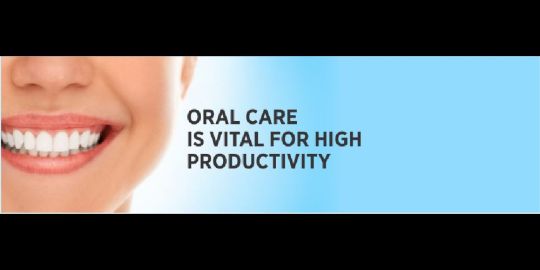
When you get up in the morning, does your smile make you feel better?
Remember, oral health is connected to many other health conditions beyond the mouth. Healthy teeth not only enable you to look and feel good, they make it possible to eat and speak properly. Good oral health is important to your overall well-being.
It may not seem that easy to keep up with your oral care at the office, especially when you're busy with multiple tasks, or working long hours. But there are ways to make oral care more convenient. Look after your teeth with help of below tips.
Boosting Success With A Smile
A healthy mouth means fresh breath. About 25 percent of people have chronic foul breath. Researchers around the world figured out years ago that gas-emitting bacteria on the tongue are largely responsible for rotten breath. Besides brushing, rinsing your mouth with plain water every time after you eat, gives protection against bad bacteria. It helps you to get rid of food particles that get stuck in your teeth.
Don't brush too hard
Brushing twice a day is a good practice. But brushing too hard can damage the root surfaces of the teeth by abrading them. Exposed roots become more sensitive and at greater risk for decay. As surfaces also are not covered by the super-hard enamel that protects the crowns of your teeth and therefore they wear quicker.
Don't snack sugary foods between meals
According to the National Institutes of Health (America), tooth decay is the most common chronic disease even though it's almost entirely preventable. Sugary foods between meals are the major contributor to the problem. Sugars are consumed by oral bacteria, which then release acids causing tooth cavities. The less sugar you consume, the better for your teeth.
Say hello to cheese
Cheese is great for your teeth. It has high levels of phosphate and calcium, which naturally strengthen teeth. It also helps balance the pH level in your mouth, which means less harmful acid. You can count on cheese as the best alternative to satisfy a snack craving because it increases saliva flow and helps to clear sugar from your mouth.
Water Is Wonderful
Stay hydrated at your desk by sipping water, not sugary pops and juices. Keeping your mouth moist is important because mouth dryness increases biofilm (plaque) accumulation and risk for both tooth decay and gum disease. Mouth dryness is also caused by smoking, alcohol and caffeine.
Practice good oral hygiene daily.
· Brush your teeth at least twice a day.
· Do floss at least once a day.
· Limit food with added sugars.
· Replace your toothbrush every three months.
· Schedule regular dental check-ups and cleanings.
· Avoid tobacco use.
We all work hard for our physical and mental health but we tend to ignore our oral health. Everything is connected to our oral health because your mouth, is the gateway to your body. Oral hygiene is important throughout the day, not just in the mornings and evenings.
0 notes